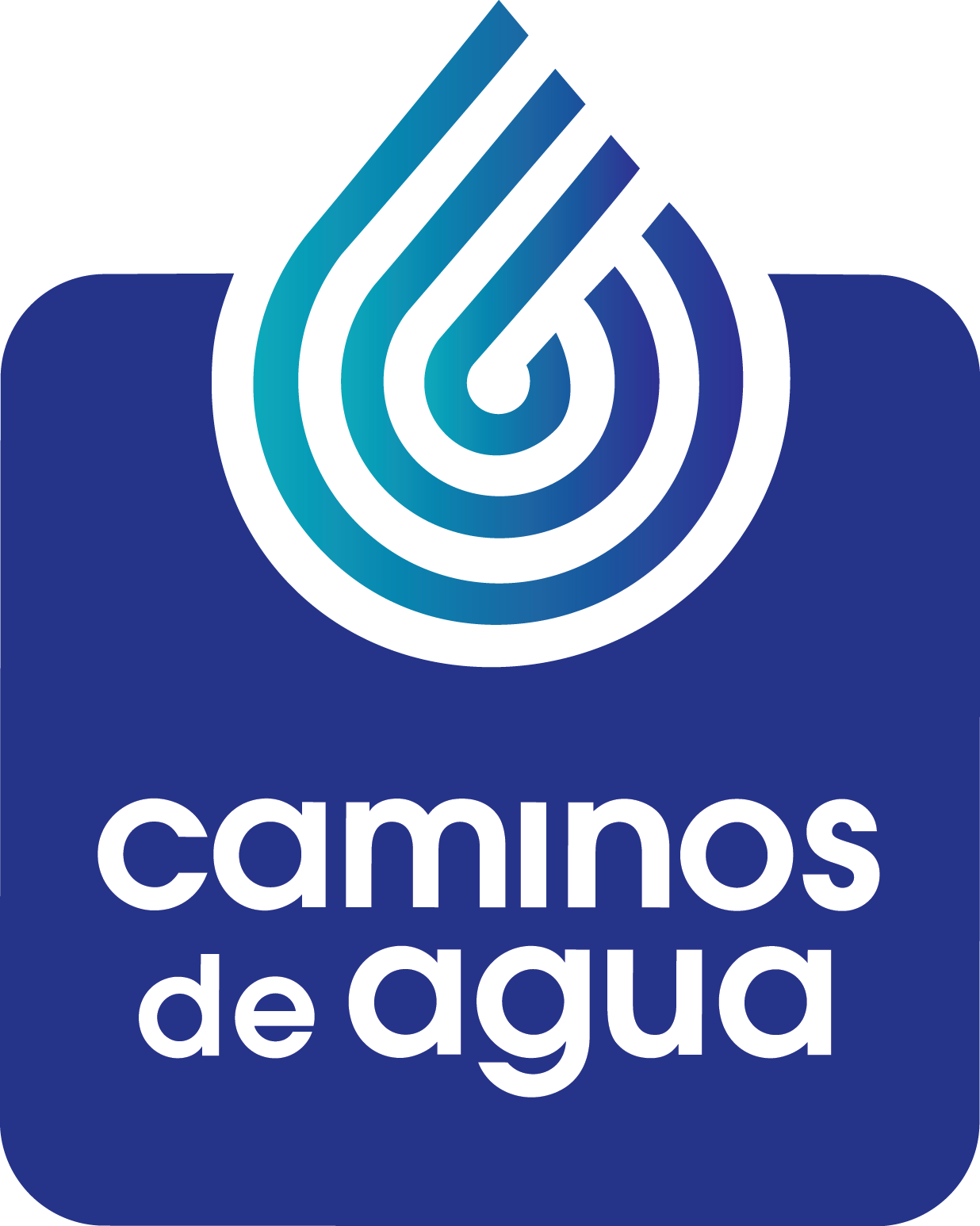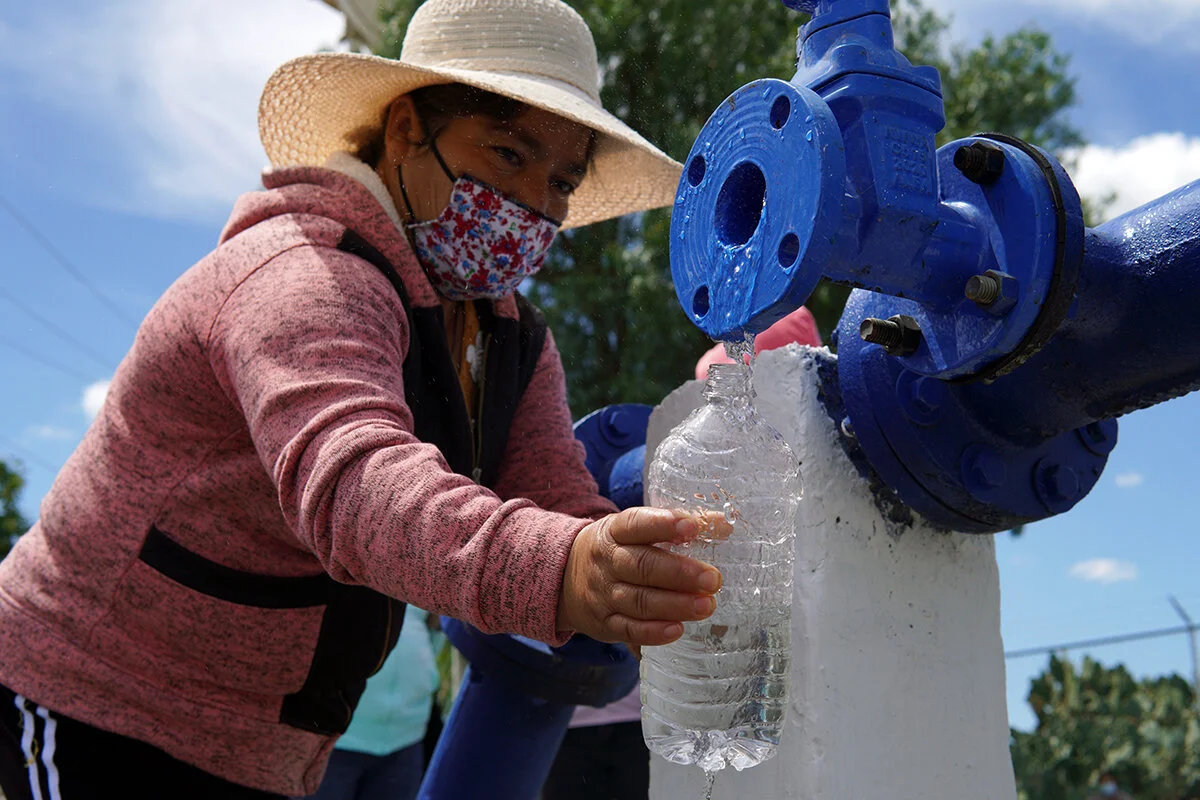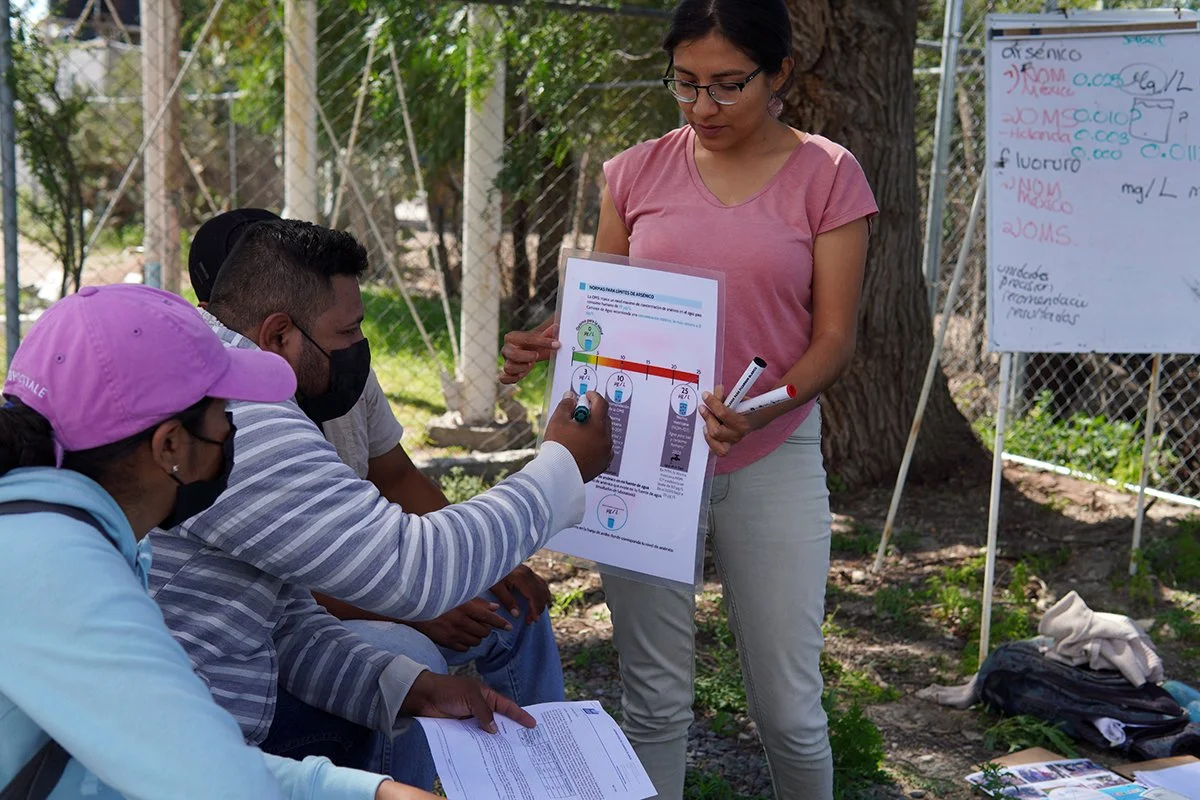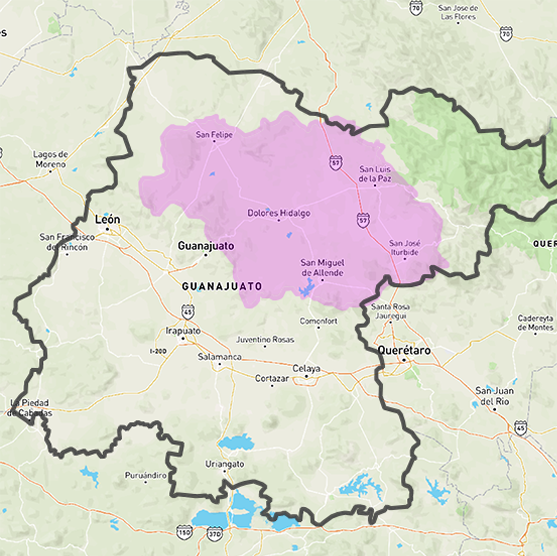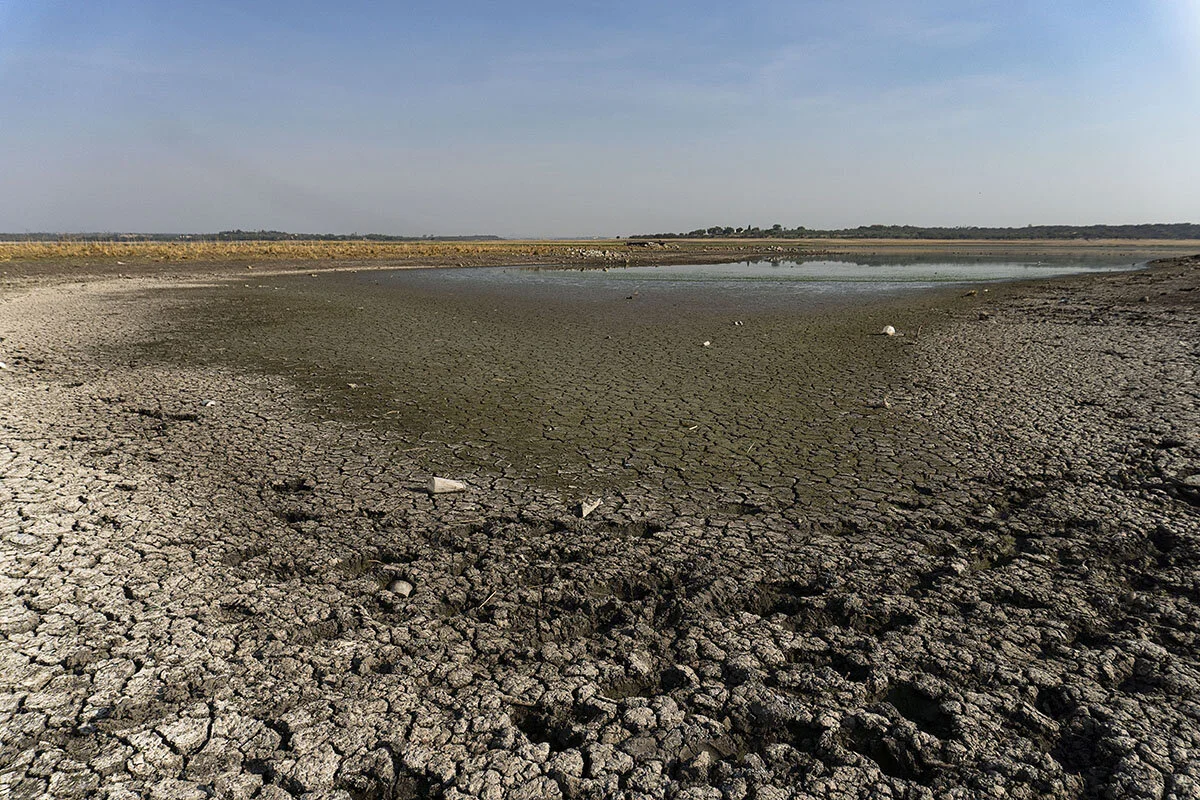Virtual Talk | The Truth About Your Water
Photo: A community member taking a water sample from the community’s well.
About the Talk
Dylan Terrell, co-founder and Executive Director of Caminos de Agua, has been invited to give an online talk regarding the current state of water in San Miguel de Allende and the surrounding region. This is an important opportunity to learn more about a growing crisis that affects us all and have your questions answered. The talk is hosted by the Jewish Cultural and Community Center of San Miguel through Zoom. You can register for the event by clicking on the button below. The event will be held virtually on December 8th, at 4:00 pm.
About Caminos de Agua
Photo: Members of the community of La Norita del Refugio building a Rainwater Harvesting System.
Our mission is to improve human health and community well-being through adequate and affordable access to clean water.
We provide innovative water solutions for communities at-risk on our aquifer in Central Mexico, and leverage those solutions for others confronting similar water challenges around the globe. We employ a unique bottom-up approach to working cooperatively within these communities, and freely share the results of our rigorous testing and analysis of local water supplies. We work in partnership with grassroots community organizations, leading research institutions, government at all levels, and other nonprofits to effect positive change in water awareness, solutions, policies, and practice, in an effort to create adequate access to safe, healthy drinking water supplies.
The Problem
Photo: Ana, Community Organizer of Caminos de Agua, showing a graphic with water contamination levels to a group of community members.
In Mexico, 52% of the population (~67 million) live with some form of water scarcity: more than 47 million do not have daily or continuous water access and an estimated 9-11 million have no water service at all. At the same time, 75% of water is used for agriculture. In the state of Guanajuato, for example, overexploitation for industrial agriculture is reducing groundwater levels by two to three meters per year—30 times above the eight-centimeter loss per year that qualifies as "extreme water stress". The decrease in groundwater levels is forcing wells ever deeper into geological substrates, which has resulted in the emergence of naturally-occurring chemicals in local groundwater supplies. In Guanajuato, arsenic levels are up to 23 times higher than the World Health Organization recommendations and more than 12 times higher for fluoride.
Chemical contamination of water supplies is a serious public health crisis. Arsenic and fluoride, for instance, are closely linked to dental fluorosis, crippling skeletal fluorosis, chronic kidney disease, skin disease, and various cancers. Children are at greatest risk, as their growing bodies absorb these minerals at a much higher rate, and exposure to high fluoride during childhood has shown to have severe impacts on children’s cognitive development and learning ability later in life. However, lack of adequate water monitoring means the problem has remained largely unknown and therefore, untreatable.
Beyond polluting groundwater, overexploitation causes even deeper wells to dry up, leaving entire communities without access to water. Residents are forced to fetch water from alternative sources that are often unreliable, expensive, or unsafe, putting their physical and economic wellbeing at risk—especially for women who are usually responsible for collecting water.
Current solutions to improve access to safe water are not adequate for rural contexts, as they are either prohibitively expensive or not trustworthy. We believe that this crisis must be faced with both innovative, low-cost solutions that address the current needs of marginalized communities, as well as long term strategies to tackle increasingly complex water challenges.
Image: The Upper Rio Laja Watershed (pictured above in pink) spans across seven municipalities of Northern Guanjuato. It serves more than 680,000 people.
Photo: Allende Reservoir pictured above was at 15% capacity at the beginning of 2021. The lowest it’s been in more than a decade.
Our Strategy
Caminos combats water scarcity and contamination in marginalized communities through three key strategies:
Developing and implementing community-led, low-cost technologies for capturing and treating water;
Raising awareness at all levels about local and global water challenges; and
Assembling multi-stakeholder collaborations to affect long-term policies and solutions.
Our strategy starts with monitoring and mapping water quality and scarcity challenges at the community level. To date, we have tested more than 600 sites, mostly community wells, throughout the region. We partner with grassroots and community organizations that already have a deep understanding of local challenges and can facilitate relationships of trust with locals. Once invited to a community, we work in tandem with local partners on an intense education and consensus-building process to ensure that solutions are responsive to real local needs. Our participatory process involves communities in designing, building, and maintaining water collection and treatment technologies. Through a series of workshops and community meetings, we share their findings on local water quality and explain the available options. If the community decides to take action, we then provide technical training and a seven-module educational program and then support community members to build and maintain the systems themselves and make all decisions regarding organization, beneficiaries, and locations. Along with installing more than 5,000 of our certified ceramic filters in homes around the country, we have also partnered with more than 80 communities and 30 schools to build 360+ large-scale rainwater harvesting systems, with more than 4.1 million liters of healthy water storage, representing a lifetime of clean water for thousands.
We take an unusually collaborative approach: in addition to local communities and grassroots organizations, we have partnered with leading international universities and other institutions, like Engineers Without Borders-UK, to develop appropriate solutions. Our Technology Development Team, working through these collaborations, has created pioneering technologies that deliver more affordable, adaptable, and durable technologies to ensure access to water in communities that are largely underserved by traditional markets. To date, we have developed two main solutions: Aguadapt and a Groundwater Treatment System (GTS). Both are simple and low-cost, utilizing universally available, inexpensive materials so they can be easily replicated in different contexts. Further information about both technologies can be found on our website (www.caminosdeagua.org)
About Dylan Terrell
Dylan Terrell is founder and current executive director at Caminos. Dylan grew up in the United States in a family that greatly emphasized working to create a better world for everyone. He volunteered with his grandparents’ community organization from a young age, where he was exposed to diverse social problems ranging from immigration to housing. He is constantly inspired by his grandfather’s words: “If you’re not finding a way to help improve the lives of real people, every day, then you’re missing the point.” This ethos has helped him to take risks and make difficult choices to continue serving others, even when it meant going against the tide.
At 17 years old, Dylan took an unusual path before starting college: he traveled to Guatemala to volunteer and learn about the country. He became enamored with Latin America but was struck by the rampant inequality throughout the region. This stop became the first of several Latin American countries where he would later live and work in. While working in an orphanage in Peru, he became passionate about promoting sustainable development and decided to pursue a master’s in Global Sustainability and Rural Development. During his master’s program in Colorado, his work with a grassroots nonprofit took him to Chiapas to work with indigenous communities on social development projects. However, in splitting time between Mexico and the U.S., he grew frustrated by the lack of effective and deep impact over his short visits.
That is why, after meeting like-minded people in Guanajuato, he decided to build up a new project to develop solutions based on real community needs. From day one, he fully committed to the work by moving permanently to live in Mexico. Initially, the aim of his organization was to respond to local issues with sustainable technologies, training, and support. But it was through partnering with—and listening to the needs of—local communities and grassroots organizations that he understood water scarcity and contamination as the most urgent problems in the region and decided to launch Caminos de Agua.
Photo Gallery About Our Work








If you have any comments, please contact us at:
info@caminosdeagua.org
